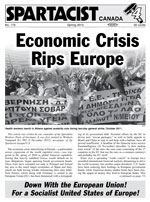
On the Call for a Constituent Assembly The following is adapted from Workers Hammer No. 217 (Winter 2011-12), newspaper of the Spartacist League/Britain. For more in-depth Marxist analysis of the situation in North Africa, see “Tunisian Elections: Victory for Islamic Reactionaries,” Workers Vanguard No. 993 (6 January) and “Egypt: Military and Islamists Target Women, Copts, Workers,” WV No. 994 (20 January), also available on our website, www.icl-fi.org. In our propaganda on the overthrow of Egyptian dictator Hosni Mubarak, the International Communist League stressed the need for the proletariat to come forward as a leader of all the oppressed in the struggle for socialist revolution. We explained, “Elementary democratic rights such as legal equality for women and the complete separation of religion and state; agrarian revolution to give land to the peasants; ending joblessness and grinding poverty: the basic aspirations of the masses cannot be met without the overthrow of the bonapartist capitalist order” (“Egypt: Military Takeover Props Up Capitalist Rule,” SC No. 168, Spring 2011). However, we also raised the call for “a revolutionary constituent assembly based on universal suffrage,” as we did in our material on the overthrow of Ben Ali in Tunisia. Subsequently, we in the ICL have re-evaluated this position. We have concluded, in light of historical experience, that the call for a constituent assembly is not valid or principled from the standpoint of the proletarian revolution. A resolution recently adopted by our International Executive Committee stated: “While the Constituent Assembly played a progressive role in the great French bourgeois revolution of 1789, historical experience since has demonstrated that this ceased to be the case thereafter. Beginning with the revolutions of 1848, in every situation where a constituent assembly or similar bourgeois legislative body was convened in the context of a proletarian insurgency its aim was to rally the forces of counterrevolution against the proletariat and to liquidate proletarian power. This was evident in the Paris Commune of 1871, the October Revolution of 1917 and the German Revolution of 1918-19. Though never subsequently codified by the CI [Communist International] as a general statement of principle, the thrust of the Bolsheviks under Lenin and Trotsky’s leadership following the October Revolution was to treat the constituent assembly as a counterrevolutionary agency.” In Russia in the spring and summer of 1917, the Bolshevik party advocated a constituent assembly, while the bourgeois provisional government refused to allow it. After the working class seized power in October, under the Bolshevik-led government, elections for a constituent assembly were held. However, voting returned a majority to parties hostile to the Revolution, who refused to recognize the victorious soviet power. The constituent assembly had to be dispersed. Trotsky himself raised the call for a constituent assembly at times, years later. Like our Trotskyist forebears, we have used this demand many times. We motivated it as a means to address the democratic aspirations of the masses in countries under dictatorial rule, as a lever to mobilize the working class, drawing the oppressed behind it, in the struggle for socialist revolution. However, the call for a constituent assembly is not a democratic demand. A constituent assembly is a form of bourgeois government and has as its purpose the administration of bourgeois class rule. For communists to raise this demand can only create the illusions in capitalist democracy that it is our task to combat. The call for a constituent assembly in fact runs counter to the program of permanent revolution.
|
|
|||||||||||||||||||||||||||||||||||||||||||||||||||||||||
